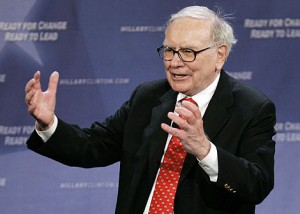Berkshire Hathaway celebrated its 50th anniversary this past month! Congratulations to all the great people in the different businesses within this great organization. 50 years is an incredible milestone for any business.
I’m sure this not the first article you’ve read celebrating their incredible growth and prosperity. I wondered: Can Warren Buffett teach you to build a great business?
I hope to share several ideas that I’ve learned working with various organizations within Berkshire Hathaway family that can help you build a more valuable business.
I’ve been working with Berkshire Hathaway for the past 30 years.I started my career selling Kirby Vacuums. When Warren Buffett bought Scott Fetzer in 1986, I became part of the Berkshire Hathaway family. Over the years I’ve worked with over 25 senior level executives within their many different organizations.
I’ve also worked with several publicly traded companies that Berkshire Hathaway has large holdings in. This has provided me a significant opportunity to look inside Warren’s investment strategies. I’ve been working with Warren Buffett’s businesses since he was only a billionaire. I have also been lucky enough to see how he evaluates, acquires, and grows businesses in a number of industries. I think I can help you grow a more valuable business.
The first rule of building a business Warren Buffett would love is you must build a great leadership team. This has been discussed in many articles and books over the years. Most writers miss the role Charlie Munger plays in their organization’s success. He provides Warren with the perfect partner when it comes to evaluating executive talent in the organizations they invest in. Charlie is one of the most brilliant judges of talent anywhere. As importantly, this dynamic duo provides an interesting view on the future of executive leadership. We will be doing a blog on this in June.
The second rule of building a business Warren Buffett would love is you must create an extraordinary brand. They prefer to buy organizations with a moat around them. I call it durable competitive advantage. Warren is an expert at understanding what makes a strong brand in the markets his businesses’ participate in. The key lesson here is there are many successful brands that you and I may never have heard of, but Warren has. He understands the market dynamics that create the breakthrough customer experience in targeted industries. You must work to create a brand that stands the test of time.
He always shares that if he can’t understand the industry dynamics he won’t invest. An interesting side note is that over the past several years he has invested in both IBM and Intel. As industries mature, it becomes easier to understand where the greatest opportunities come for long term sustainable growth. He also hired two younger investment officers to help him identify and seize new market opportunities. In several recent acquisitions we see BH moving more aggressively into maturing technology markets with significant upside as baby boomers leave the workplace.
When I first heard about Warren buying my friend’s organization, I was told an interesting story of how well Warren understands the industries he invests in. He knows the margins and operating expenses as well as individuals who work in the industry. For many years, he would review all annual reports from the many competitors within the industries he owned businesses in. This knowledge has provided significant new investment opportunities in the financial service industry, manufacturing, and consumer goods markets.
One CEO I knew told me what Warren Buffett was like as a boss. He knew your numbers as well as the CFO in your business. He would also share other key numbers from key customers and competitors that provided an incredible edge to leaders I knew. If you’re talking with Warren, you better be prepared for an in depth discussion of the business you were leading. This edge provides significant advantage when competing in markets with margins that are very volatile in different economic cycles.
Many of the family businesses Warren has acquired over the years had leaders who sold their business to Warren in order to preserve that business for future generations. The relationships the original owners had been more collegial than analytical. Warren Buffett understands it take many different leadership styles to build a stronger, growing organization.
Next week, I talk about Charlie Munger’s role in growing the organization. I’ll also share the secret weapon that Warren Buffett and Bill Gates have in common. See you next week.




